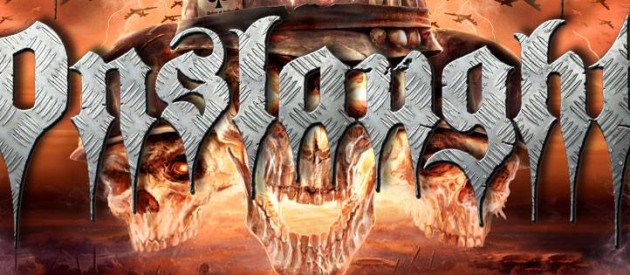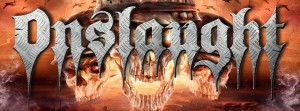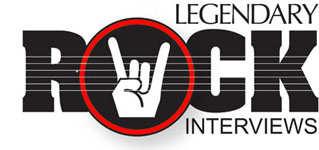Onslaught Guitarist Nige Rockett Talks Band’s History, U.K. Thrash Scene, Latest Album and More!

Guitarist and band founder Nige Rockett formed Onslaught in 1983, released their classic thrash debut “Power From Hell” (incidentally coining the phrase “Death Metal” on the song of the same name in 1985); the first of several seminal thrash releases from the band through the 1980’s. The Onslaught guys disbanded in the early 90s but later reformed in 2005 releasing another three critically acclaimed thrashterpieces, including their sixth and latest, the aptly titled “VI” on AFM Records. I recently had the chance to chat with Nige about the band’s past and present; read on….
Legendary Rock Interviews: Thanks for talking with me Nige, the new album is brutal. You had been working with famed Volbeat producer Jacob Hanson on the last record but have a new producer on board here, how was that?
Nige Rockett: We changed things, kinda at the last minute really. We were scheduled to work with Jacob again and were booked in through April but he had something major come up, possibly something with Volbeat and he had to move his schedule and everything around so we were unable to make the album deadline. So we either had to push the album back a month or two which was really not acceptable since we had some touring commitments or we had to look for an alternative producer which we found in Thomas “Plec” Johansson.
LRI: How did pushing you out of that comfort zone change things?
Nige: Yeah, I mean, it was a shame but at the same time it gave us a little more impetus I think. Something that we’ve always done, through the history of the band is kept things moving, every record has sounded completely different. I think, this time out, working with Thomas might have given us even more of an aggressive edge I feel. So, while it was sad to not have had the chance to work with Jacob again, it really turned out to be a very good thing for Onslaught in the end.
LRI: Evolution is important for an artist. Would you even be comfortable if you were still making music similar to the stuff you made in the early eighties?
Nige: There’s no way we could NOT evolve, we’re a completely different band than we were back then and have grown so much over the years. Having said that, we are proud of the past and one thing we do want to do, kind of as a nod to the past is to re-record the “In Search Of Sanity” record (1989 record originally recorded with Grim Reaper vocalist Steve Grimmett in place of Sy Keeler). It’s not something we’d ever like to do with the earlier Onslaught albums like “The Force” or “Power From Hell” but with Sy back on vocals we feel we have a really strong reason for wanting to do that. Sy was the original singer for that record but when circumstances changed he never appeared on that record. I think his absence kinda diluted the Onslaught sound at a kind of strange time for the band and with a major label involved things kind of got messed up which eventually led to the demise of the band.
LRI: When you guys finally did reunite, was there ever a thought that you might do it without Sy back on vocals?
Nige: No, no, I think it was the only way it was ever going to work. As much as Steve Grimmett was a great singer he was never really the right guy for Onslaught and the fans never really took to him in a friendly kind of way and no matter how you look at it Sy has always been considered the Onslaught singer, you know?….I think most fans favorite album from the band was “The Force” album which obviously included Sy as the vocalist and Paul Mahoney, the vocalist on “Power From Hell” record, I don’t think could have handled any of our other material so it was clearly going to be Sy Keeler or nothing really; it had to be the lineup the fans wanted to see so that was what we went for and Sy was more than up for doing it.
LRI: A lot of fans here in the U.S. have obviously been on the outside looking in as far as the British thrash metal scene but obviously Onslaught was one of a handful of bands we became aware of. As someone on the inside looking out, did you see similarities between what bands like yourself were doing in the U.K. and what was going on here in the states with our thrash metal underground?
Nige: The U.K. thing was kind of weird really. The fan base for thrash metal was massive. Whenever the American bands would come over it was huge venues and sold out shows but it never kind of worked the other ways for the British and European bands in the U.K. which was kind of strange. The American bands were the kinda de facto leaders of the genre at the time. We actually did pretty good business in the U.K., not to the likes of Anthrax, Slayer and Metallica but we did a lot of good business and it was a struggle; it wasn’t as easy for us as it was for the American bands. Also, the German bands struggled too when they came to the U.K. which I could never figure out because, as I said, the amount of fans in the actual scene here was massive. I mean, things have changed to some extent now, I think a band like Kreator can do well obviously but things have always been just a little bit different in terms of the U.K. thrash scene.

Nige Rockett of ONSLAUGHT
LRI: A lot of the L.A. artists I’ve spoken to remember the punk scene taking over and it immediately being visible in the appearance of the scene and not just the sound. Onslaught has punk and hardcore roots as well, how do you remember that?
Nige: We obviously came from a hardcore/punk background and bands like Discharge and GBH had kind of a more metallic sound to what they were doing than a lot of the other punk bands. Though we were always into the kinda metal stuff as well, bands like Motorhead, Priest and the more energetic side of metal you know, bands that I think punk took a lot of influences from too I guess. It kind of felt natural to us as we learned how to play; when we started the band we were really not the best musicians. As we kind of improved our playing standards we began to take on board more and more metallic influences. I mean, Metallica, Slayer and all of those bands were all influenced by the hardcore and I think it was kind of a natural progression for the kids everywhere to move on to something that was just as aggressive as punk was when thrash hit, the major difference being that thrash metal had a lot more energy, I would say. I think it was quick change in the U.K. It happened within a couple of years really. Punk was huge in 82 and 83 and we were lucky enough to be at the forefront of thrash in Britain and were lucky enough to take our fans with us on that journey so to speak.
LRI: Business wise, how different is the new album and touring cycle since reuniting than it was in the early days. How much of your life is taken up by Onslaught?
Nige: It depends, the last few years things have grown at a pretty steady pace and obviously the more popular the band has become, the busier we’ve all been individually, which is great of course. It’s also very different though from when we were around in the late 80s because in those days we were signed to a major label and we were just professional musicians at that time. We were able to dedicate the whole of our lives to music and had the luxury of being able to write all the time and rehearse every day. That’s not the case now so now when the band gets busy my life gets extremely busy because now we’re not just full-time musicians, we have to work and look out for our respective families as well as obviously looking out for the band so it’s quite different to answer your question. We’re basically running two careers and two lives at the same time.

Onslaught 2013
LRI: It seems like despite your major label experiences early on, the successes of the reunited Onslaught have almost been unheard of compared to the band’s early years. You were able to finally undertake a U.S. tour and the audiences have grown increasingly younger and crazier, is that fair to say?
Nige: Oh yeah, we’ve done far more in the last 7 years than we ever did in the previous incarnation. It’s been great that things have moved so fast this time around and a lot of that really is that there’s a generation of kids who’ve taken up on the band whilst we’ve still kept a lot of the original fans from the first time around. That’s probably what’s kept us more busy than before and made it so much fun, we’re getting one, two, maybe three generations of people who are interested in Onslaught now. It can’t be a bad thing.
LRI: How is the newer material going over in the setlist and are you finding yourselves as excited to be playing the classics as ever?
Nige: Yeah, the new material is of course exciting for us to play but we will always play the classic material that the fans wanna hear and it honestly gives you a massive adrenaline rush when you see their reaction to those old songs, it really does. We recently came back from Russia and we found that the crowds there were really young but virtually every show these guys knew every word of every song, old songs, new songs in particular which was really nice to see. I love playing the new stuff, it’s got a lot more aggression and a lot more technicality to it but it seems to sit well with the older stuff when you mix the set up as we do. It seems to blend well to the point where you can see the whole picture and the new stuff kind of weaves in and out and works really well with our new shows.
LRI: I know getting to the U.S was a huge deal for you guys and I am sure Russia was as well, is there anywhere else that you particularly wanna bring Onslaught to or have you hit a lot of the places you’ve dreamed of touring?
Nige: No, there are still lots of places we’ve yet to bring the show to. That’s one of the most exciting things about the band anymore, it seems like every year we’re able to make it to another territory we haven’t been to, which is exciting. The States was high on our list of places we hadn’t toured in; it was always amazing to us that we’d never reached you guys over all these years and it was something we really got a taste for so now we wanna come back again to the U.S. For me personally, China and India are right up there as well. I kind of like to go to mysterious places that you might not ordinarily think about and you really don’t know what to expect when you get there, that’s kind of exciting to me personally.

Category: Interviews



